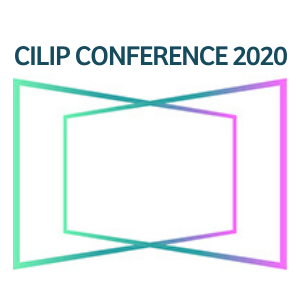
Alice Morrissey, newly-qualified librarian and recipient of the Information Literacy Group bursary to attend the CILIP Conference Reimagined 2020, has kindly provided a review of the event, which took place online for the first time.
My name is Alice Morrissey and I’m a Library Assistant in Dún Laoghaire Institute of Art Design and Technology in Dublin, Ireland. I started in this role in March 2020, on the very first day of lockdown here in Ireland. A strange start to a new job to say the least! This unusual start meant I had to gain new skills very quickly on top of orientating myself in to my first qualified role in an academic library. My role involves teaching information literacy to third-level students “live” online, creating online learning material to be consulted later at the user’s discretion, as well as creating graded information literacy courses tailored to the needs of a lecturer’s classes. It was for this reason that this year’s CILIP Conference Reimagined could not have been more welcome to help with these new pressures and situations.
The conference had smaller satellite events held over a number of weeks in the autumn, but the main day of the conference was held online on November 19th 2020. I cannot discuss the conference without first discussing the platform it was held on. It was an interesting experience that I’m glad I got to try out. This year has had countless difficulties, but I must commend the CILIP conference team for overcoming them and managing to host a conference that not only ran smoothly online, but was easy to use and enjoyable to engage with. The conference was held on the platform PheedLoop, which allowed for much more engagement between attendees and speakers than a regular Zoom session would. I was able to navigate the platform easily, adding the sessions I wanted to attend to my calendar, and was able to talk with exhibitors and vendors. There was a function to send a message to another attendee, thus bringing back the networking aspect of conferences that I can imagine we’ve all been missing. It was the best way to mimic the regular days of conference attending, but from the safety of our own spaces. The PheedLoop platform was left available after the conference had finished, meaning you can go back and watch recordings of synchronous sessions you didn’t get to attend. This has really enriched the experience, and is something that wouldn’t be possible in a traditional in-person conference. In this way, the limits of online attendance have been turned into an enhanced experience you may not get otherwise.
Addressing isolation
An overarching theme of this conference, reflecting the current situation in the world, was possible isolation in the job, as addressed by Alison King in her lightning talk. This was a relevant and reassuring presentation, illustrating several methods to beat social and professional isolation. This applies chiefly to sole practitioners, but with remote work and learning so prevalent this year, we can all take something away from what Alison was saying. There is hope to end isolation through various avenues, whether it be starting a staff book club, engaging with professional organisations like CILIP, or volunteering to be on as many institution-wide projects as possible.
Professional skills registration
Encouraging us all to combat misinformation and deliver services in a new environment was Jo Cornish talking about professional skills registration. Jo rightly asserted that we are never finished learning; there are always things we can do better as librarians. Continued professional development and the utilisation of tools such as the CILIP PKSB means we have a shared skill set we can use to develop ourselves and our profession. Professional registration is the machine we have built for our profession to achieve all that we have, as it’s based on evidence and applied practice. Jo’s presentation was the reminder that we can always continue to strive to do better.
The Digital Pivot
A session I was most interested in was titled “The ‘Digital Pivot’ – the role of librarians and knowledge specialists in moving teaching and learning online”. With my new academic library role meaning I have to adapt to a lot more online teaching and learning than initially expected, this session was of great value to me. As Jane Secker put it: “librarians are some of the most innovate teachers and so there is an opportunity here to embrace new types of teaching methods online”. Claire McGuiness and Crystal Fulton, who I knew well from having taken their classes at UCD, provided real-world insight into their online teaching experiences during a pandemic. Both speakers detailed how their students were willing to engage even in an online environment, especially when given incentives like reward badges. This is supported by Hassam Kassem who reported how online literacy sessions in the Open University increased significantly compared to last year, and that this year’s group of students participate noticeably more with the material than usual.
Crystal Fulton illustrated how you can still do normal activities like field trips in a virtual world, by utilising tools such as open access webcams from around the world; a very interesting approach that perhaps we wouldn’t all have realised we could do! My takeaway from this session overall was that, if you’re willing to engage with more tools and to support your students, the digital pivot can create new opportunities for activities and engagement.
Inclusion
Another theme at the conference was inclusion. Both Deborah Varenna in her lightning talk and Tracie D. Hall in her keynote speech, addressed the issue of possible exclusion from the library world. Deborah emphasised the importance of making people of all abilities, backgrounds, and diversities welcome in the library space. She made the point that speakers need to be paid for their work when being invited into your library. Not doing so can insert a barrier to speaking roles which can mean that those who cannot afford to give up their time for free will be less represented in the library space.
Tracie D. Hall gave an excellent keynote also focusing on those who can be excluded from the information landscape in the United States. She discussed how libraries are a hub that provide many things disadvantaged communities can lack – from broadband access to postal voting drop-off points. These communities are overwhelmingly Black and Latino, and so when libraries are systemically defunded, it results in socioeconomic difficulties and divisiveness. Opportunities to, for example, apply for jobs online become limited, effectively condemning America’s people of colour into a cycle of unemployment from which they cannot escape. There is a direct link between evictions in run-down neighbourhoods and the closure of public libraries. Tracie discussed how we are in the third wave of library services, in which we can close this digital access and literacy gap. She believes, and I imagine we all agree, that we have a responsibility to aim towards this as librarians in whatever role we may have. Tracie’s presentation was poignant, and emphasises to us all the crucial role we have in fighting against information poverty in society, and the devastation that the removal of information and service access can cause.
These are my highlights from an unusual but excellent CILIP conference. The conference themes and presentations were extremely relevant to my library role, and I’m sure the other attendees would say the same. Being able to safely and virtually network and engage with other professionals facing the same struggles as myself both inspired and buoyed me to keep striving for betterment in my teaching and learning role. I left the conference with a renewed sense of our societal purpose and value as a profession, and inspired to try new techniques in my teaching & learning sessions.
Email: Alice.Morrissey@iadt.ie
Twitter: @AliceMorrissey9
LinkedIn: ie.linkedin.com/in/morrisseyalice
If you’re reading this and you attended CILIP Conference Reimagined 2020, what did you think of the platform? Did you find it easy to use? What struck you most about what the speakers had to say?



